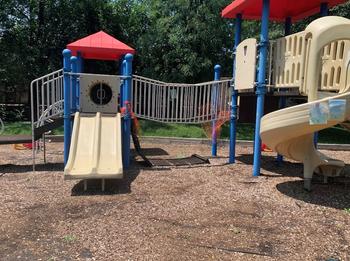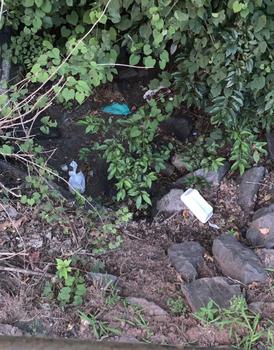
[ad_1]
Immersing locally is a core part of the worldwide and group well being curriculum on the College of Public Health. Community-based studying is the intentional engagement with the group to grasp the social determinants of health (SDOH), that are outlined because the circumstances by which individuals are born, develop, work, reside, and age in addition to the broader methods that have an effect on one’s life.
Adjunct college and GCH 360 teacher Shannyn Snyder is a powerful advocate for group engagement along with in-class studying.

“Community-based studying helps college students join what they’re studying within the classroom to real-world software, just like experiential studying,” stated Snyder. “CBL asks the student to look at the community around them and engage in a hands-on activity that will help them build a better understanding of how an environmental issue may be disproportionately affecting a population in that community.”
GCH 360 Health and Environment delves into SDOH and gives the chance to finish community-based studying (CBL) tasks the place college students dedicate time to communities in Virginia, seeing how the organic, bodily, and chemical components within the surroundings have an effect on a inhabitants. Students learn the way public well being rules can have an effect on the communities round them.
“During the class, I was guided on research various topics regarding global and community health that I assumed would only apply to developing countries, not my neighborhood in the US. However, as I developed my project, all the health concerns discussed in class can still affect our neighborhoods,” stated Hyewon Shim, a pupil in Snyder’s GCH 360 course.
For their CBL tasks, college students select environmental well being subjects to handle and are tasked with growing authentic options to their recognized subject. Unlike conventional instruction strategies, college students exit to be inside communities in northern Virginia.
“GCH 360 is a perfect way to practice getting to know a community, especially ones you may not be familiar with since it gives you the unique opportunity to explore and see beyond what you already know on a subject,” stated Bethany Ditzler, who took Synder’s course this summer season.
Mindy Lu, one other pupil, selected to analyze the accessibility of playgrounds in Falls Church and gained a deeper appreciation for SDOH by finishing her CBL venture.
Lu’s CBL venture centered across the surroundings as a SDOH, particularly how impactful outside play areas may be on youngsters’s bodily, psychological, and emotional well being. After assessing three areas, Lu recognized causes for concern in a number of playgrounds. In a sequence of images Lu captured damaged and lacking gear in addition to pathways not suitable for protected strolling.
Following her observations, Lu proposed forging stronger collaboration amongst group facilities, non-profit organizations, and native governments to create safer play areas for the group’s youngsters.
“Addressing the social determinants, and creating supportive environments in this specific case, needs the collaboration of various sectors in public health to make a substantial impact on improving health outcomes, reducing disparities, and fostering a healthier society for all,” Lu stated.

Michelle Rivas, one other GCH360 pupil, dedicated her time to trash cleanup in two Virginia neighborhoods.
After observing the notable quantity of litter occurring, Rivas recommends putting in extra rubbish disposal areas to make correct waste administration simpler for group members.
“This project allowed me to stop for a minute and think about how these environmental issues are impacting us directly, our planet, and how we can all do our part to help the planet and make our community better,” stated Rivas
By the conclusion of the GCH 360 course, college students are extra keen than ever to exit and serve their communities.
“GCH 360 has taught me so much that I will carry on in the future as I engage with and advocate for communities impacted by issues such the one I addressed in my project,” stated Rivas.
Like Rivas, Lu is extra assured to efficiently enter communities as a public well being chief.
“Through the course, I learned to identify the underlying factors contributing to an issue. Armed with this knowledge, I now have the capacity to explore and propose potential solutions and interventions to address the problem effectively,” stated Lu. “This newfound awareness empowers me to take proactive steps, advocate for change, and collaborate with others to make a positive impact on the well-being of my community.”
[adinserter block=”4″]
[ad_2]
Source link